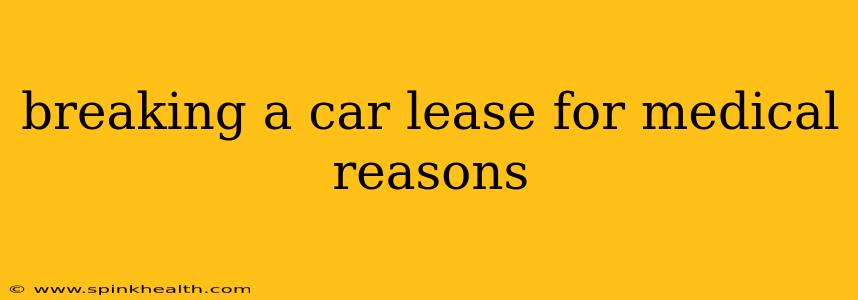Breaking a Car Lease for Medical Reasons: Navigating a Difficult Situation
Life throws curveballs, and sometimes those curveballs involve unexpected medical emergencies that drastically alter our plans. Imagine this: you’re happily cruising along, making your lease payments, when suddenly a serious illness or injury makes driving, or even just being in a car, incredibly difficult or impossible. Breaking a car lease under these circumstances can feel overwhelming, but it’s not insurmountable. This guide will walk you through the process and answer some common questions.
This isn't just about the paperwork; it's about navigating a challenging period while dealing with health concerns. Let's explore how to approach this situation with clarity and potentially minimize financial repercussions.
Can I Break My Car Lease Due to Medical Reasons?
The short answer is: maybe. There's no guaranteed escape clause specifically for medical reasons in most standard lease agreements. However, the possibility of early termination hinges significantly on the specifics of your lease contract and the severity of your medical condition.
Your best course of action begins with carefully reviewing your lease agreement. Look for any clauses addressing early termination, penalties, and potential exceptions. Some leases might allow for early termination with documented proof of extenuating circumstances, which could potentially include a certified medical diagnosis.
What Documentation Do I Need?
This is crucial. You need strong, verifiable evidence to support your claim. This typically involves:
- Detailed Medical Documentation: A letter from your doctor clearly stating your diagnosis, the limitations it places on your driving ability, and the anticipated duration of these limitations. The more specific and detailed the letter, the better.
- Copies of Medical Bills and Records: Supporting documentation can strengthen your case.
- Proof of Attempts to Sublet or Sell the Lease: Your leasing company might be more receptive if you demonstrate proactive efforts to find someone else to take over the lease.
How Do I Approach My Leasing Company?
Direct, open communication is key. Contact your leasing company immediately. Explain your situation clearly, calmly, and compassionately, providing them with copies of your medical documentation. Be prepared to negotiate. They may offer various options, such as:
- Early Termination Fee Negotiation: While there's likely a penalty, you might be able to negotiate a reduced fee.
- Lease Transfer: Finding a qualified individual to take over the lease is ideal, minimizing your financial burden.
- Payment Plan: In some cases, the leasing company might agree to a modified payment plan that accommodates your circumstances.
What Happens if My Leasing Company Refuses?
If your leasing company is uncooperative, you may need to explore other options, such as:
- Legal Counsel: Consulting with a lawyer specializing in consumer rights or lease disputes can be beneficial. They can advise you on your rights and explore potential legal avenues.
- Mediation: This is a less adversarial approach than litigation, providing a neutral platform to resolve the dispute.
What if I Can't Afford the Lease Payments Anymore Due to Medical Expenses?
Facing mounting medical bills alongside lease payments can be incredibly stressful. Be transparent with your leasing company about your financial difficulties. Explain your situation and explore possible solutions, such as negotiating a payment plan or exploring options for financial assistance.
Are there any programs that can help?
There may be government or charitable programs available to assist with medical expenses or financial hardship. Researching options in your specific location is essential.
Breaking a car lease for medical reasons requires proactive communication, thorough documentation, and potentially legal guidance. While the process might be challenging, understanding your rights and presenting a compelling case can significantly improve your chances of a favorable outcome. Remember, your health is paramount, and seeking help is a sign of strength, not weakness.

